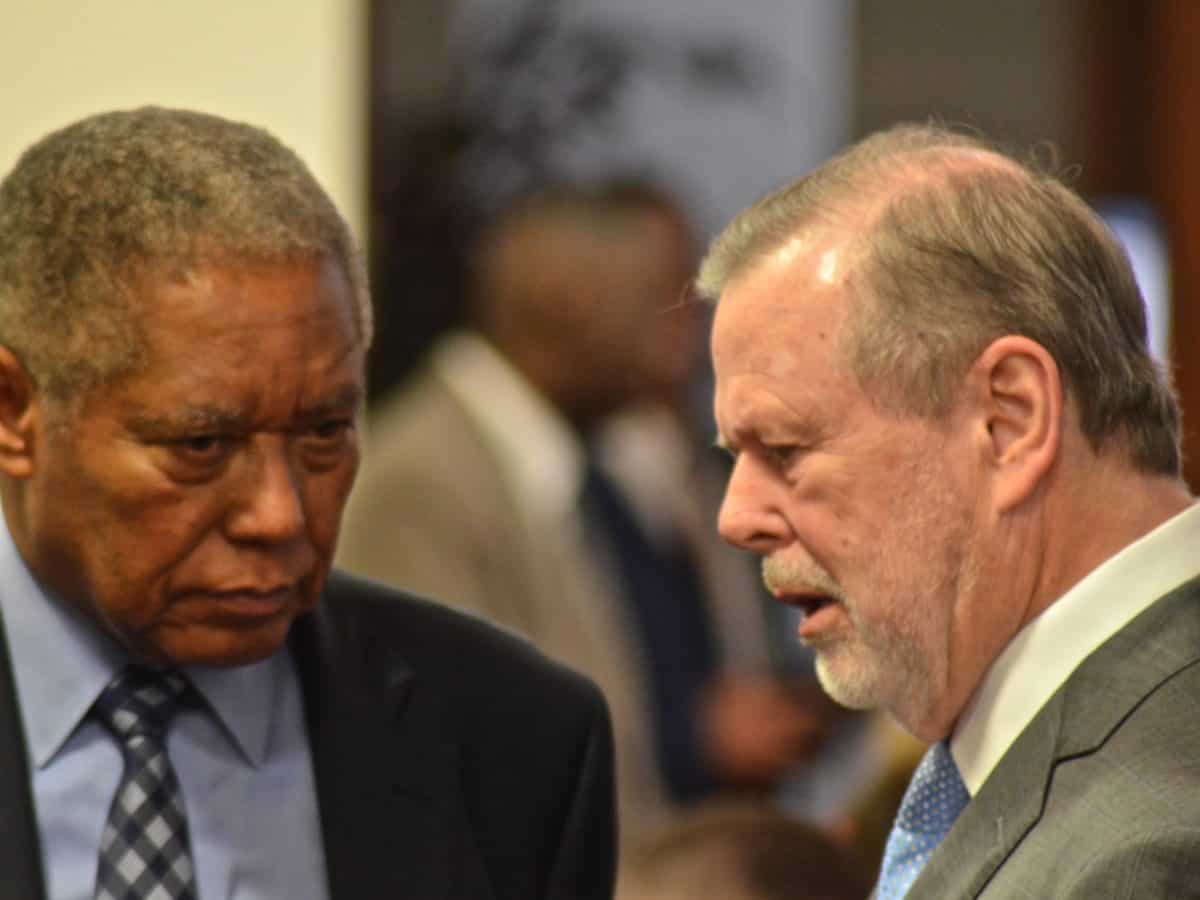

The General Assembly came back for one day to take up business from the long session, but they adjourned without resolving the teacher pay issue or passing a budget.
The budget passed by the General Assembly, as well as a bill that would have provided teacher pay raises, were vetoed by Gov. Roy Cooper in 2019. Republicans don’t have a supermajority in either chamber of the General Assembly, meaning they can’t override vetoes just by voting along party lines.
They managed to override the budget veto in the House in September by holding a surprise morning vote. But the Senate, where Republicans only need one Democratic vote to override the veto, has been unable to get the numbers to accomplish the task.
During the one-day session on Tuesday, lawmakers did not override the budget nor a bill that would give teachers pay raises independent of the budget. The veto override of the teacher pay bill was taken up and failed to pass. The budget veto override was briefly on the calendar, but was removed before the Senate adjourned.
“I don’t believe the governor is serious about negotiating a teacher pay raise. He knows and acknowledges that it’s impossible to do in isolation,” said Senate President Pro Tempore Phil Berger, R-Rockingham, during a press conference early in the day.
The governor said in a statement after the press conference that Republicans are trying to avoid negotiating with him.
“Public officials are elected to do the hard work of governing and find compromises, but Republican leaders are refusing to negotiate a teacher pay raise and saying that they are not going to pass any budget at all this year,” said Cooper in the statement. “This shows the outrageous lengths legislative leaders will go to avoid negotiating with the Governor, and it’s time for them to end their partisan obstruction.”
The budget passed by the General Assembly in June included an average 3.9% pay raise for teachers over the biennium. That includes the step increases that eligible teachers are scheduled to get anyway. Cooper vetoed the budget and negotiations stalled, leading Republicans to pass a series of mini-budgets in the fall.
One bill they tried to pass would have, again, given teachers the average 3.9% raise. But the bill included an incentive for Democrats to override the budget veto. If they helped to do so, Republican leaders said the teacher pay raise would increase to 4.9% over the biennium. That bill passed the General Assembly but was also vetoed by the governor.
Cooper wanted a much bigger raise for teachers. In his budget plan, the governor proposed an average increase of 9.1% over the biennium for teachers. Under his plan, no teacher would receive less than a 3% increase in either year of the biennium. Later in the session, he proposed a compromise proposal of 8.5% over the biennium. Under the General Assembly plan, teachers with 0-15 years of experience would only get their normal step increases, while all the extra money would go to more veteran teachers.
Berger and other legislative Republicans have accused the governor of stalling the budget with a health care ultimatum. Basically, they said he would refuse any budget that didn’t include Medicaid expansion. Cooper, however, said many times that he would be willing to negotiate teacher pay separately from the full budget.
That was a non-starter, according to Berger. He said that teacher pay encompassed so much of the money in the budget that to change it would require changes to other parts of the spending plan.
Senate Minority Leader Dan Blue, D-Wake, held a press conference today as well. During it, he criticized the Republicans for their positions on the budget, teacher pay, and other education issues.
“We have harsh realities to face when it comes to the state’s public education system,” he said. “We have failed to provide students a sound, basic education.”
He referenced the WestEd Leandro report, which made recommendations just before the holidays for the state to meet the mandates of the long-running Leandro case in North Carolina. One of those recommendations was an increased investment of $8 billion over the next eight years.
“That number may seem overwhelming, but we can get there one investment at a time. And that starts today with educator pay,” he said.
Blue suggested a compromise back in October on teacher pay that would place the average pay increase at 6.5%, but it didn’t go anywhere.
Mark Jewell, president of the NCAE, said at the press conference that the current situation is a dismal one for state education.
“Adjourning without a budget and an educator pay raise would be horrific for public education in North Carolina,” he said.
Budget impasse persists
Republicans in the General Assembly have been fighting publicly over these same issues for months with legislative Democrats and the governor. Today’s session was the last day to resolve it before the 2020 short session.
Berger said during his press conference that with the exception of news media and legislative watchers, the vast majority of the public isn’t affected by the budget impasse. The state is operating under the previous year’s budget in the absence of a new budget.
“Can you point to one, two, three, half a dozen, maybe two dozen things that would be better if we had a budget?” Berger asked. “I could do the same thing, but overall I think we’re in good shape.”
But at a teachers roundtable with Sen. Jay Chaudhuri, D-Wake, on Monday night, educators talked about the negative impacts of the budget impasse, including a lack of resources and resignations as a result of the teacher pay impasse.
Kristin Beller, the head of Wake NCAE and a teacher at Joyner Elementary, said she saw a slew of resignations come in just before the Christmas break. She said that it used to be that the first few years of a teacher’s career were the hardest and when teachers were mostly likely to leave.
“Now, we’re seeing that that is not true at all,” she said. “That people at the end of every year … there are folks who are doing a reevaluation.”
Legislators will not come back for the short session until April 28. At that time, it is unlikely that lawmakers will pass a second year budget, Berger said.
What’s next for educators and students?
Without a budget, but with a host of mini-budgets passed, what do and don’t public schools get from the legislature? Here a list of some notable items.
- Under a mini budget passed in the fall, principals will get an average pay raise of 6.2%.
- Teachers who are eligible for step increases will receive them.
- There is no new money for school construction. The budget compromise promised about $4.4 billion over 10 years for K-12 school construction and repair, but after the veto, that did not re-materialize.
- The Excellent Public Schools Act of 2019, which was meant to revise the NC Read To Achieve program, does not go into effect. It was in the vetoed budget.
- A mini budget bill provided money for most of the priorities the community college system asked for, including funding to achieve parity between the system’s short-term workforce programs and its typical curriculum programs.
- A separate bill provided money for personnel pay increases for community colleges.


